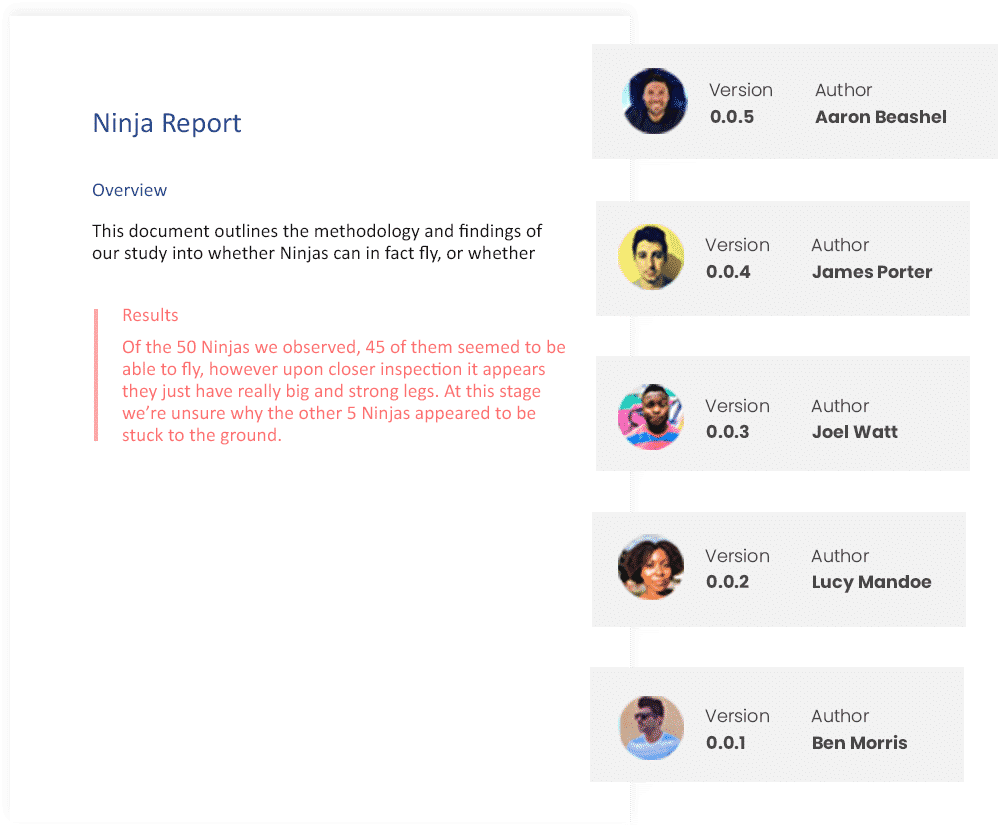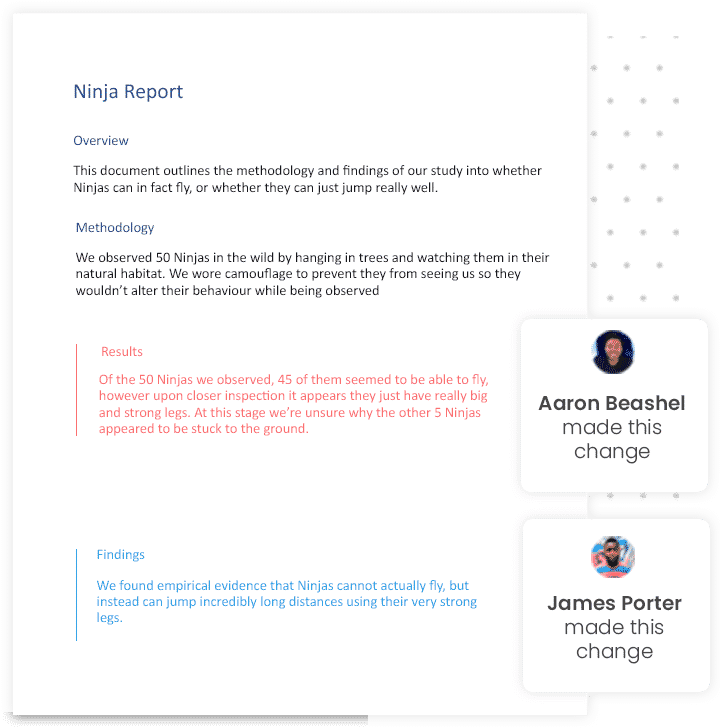How collaborating with Simul compares to Microsoft Teams
Microsoft Teams is primarily a team chat tool that has some basic document collaboration functionality that allows multiple people to work on a document at the same time.
However, that has a number of downsides that Simul can help you overcome.
Better control of changes
Collaborating on documents in Microsoft Teams means any member of the team can make any changes to the document they want, and it’s almost untraceable. Simul provides more control over what content makes it into the document and what doesn’t.
How Microsoft Teams works
The document collaboration features of Microsoft Teams are powered by Sharepoint and adopt a real-time collaboration approach where all users can edit any part of the document at any time. Think of it like a big whiteboard where everyone is writing at the same time.

PROBLEMS WITH THIS APPROACH
Edits can be made without you knowing
Because anyone can edit any part of the document at any time, someone could easily change a paragraph or statistic without you knowing.
Content can be snuck in or out
Because anyone can edit part of the document at any time, someone could easily add dubious content or remove important wording from the document with your knowledge. This can be a particular issue with legal documents.
No history of who made what changes
Microsoft Team's version history feature allows you to download snapshots of what a document looked like at certain points in time (I.e. 1:32pm Wednesday), but they contain no record of who made what changes, leaving you with no idea of who changed your document.
No ability to work offline
Microsoft Teams is only available when you have internet access, making working offline on planes, trains, etc impossible.
How Simul helps
Simul takes a different approach to collaborating on Microsoft Word documents that gives more control over content.
Instead of an online document anyone can edit at any time, when a user opens a document in Simul they’re actually opening and editing their own isolated version. Then when they save it, they are essentially ‘submitting’ it back to the main document and (if it is accepted) it gets created as a new version.

BENEFITS OF THIS APPROACH

Always know when changes are made
Simul creates a new version each time a change is made and sends you notifications, so you'll always know when your document is changed, who changed it and what they changed.

Full ability to work offline
Simul allows you to download the latest version of a document and work offline. Then, when you're back online, you simply upload it as a new version. If someone else has edited the document in that time, you can easily merge your changes in just 1 click.

Control whether changes are accepted or not
Simul allows you to control whether a user’s changes make it back into the original document or not, ensuring you retain full control of the content in your document

Full history of who made what changes
Simul's simple interface shows you a full history of every change made to the document and who made it.
A proper version control system
Microsoft Teams has very basic version history functionality that is accessed through Sharepoint, whereas Simul is a dedicated version control system with a number of additional features that make collaborating on Word documents much easier.
How Microsoft Teams works
Microsoft Teams version history functionality is powered by Sharepoint and cannot actually be accessed through Teams.
If you do access it through Sharepoint, it's more like a change log. It’s literally just a list that shows when a document was modified and who modified it.

PROBLEMS OF THIS APPROACH
Doesn’t show what changed
This basic list doesn’t show what changed between versions. To see this, you’d need to download the two versions you want to compare, open them both in Word, and either manually compare them or use Word’s Compare functionality.
Doesn’t show who changed it
It doesn’t track who made what changes, so if two people are editing a document at the same time the changes that were made will be saved as a new version in the history, but there’s no way of knowing who made what change.
How Simul helps
Simul is a dedicated version control and collaboration tool for Microsoft Word and provides advanced features such as:

Quickly see a visual history of changes
Simul’s unique tree visualisation makes it easy to understand how a document came together

See who made what changes
Simul shows exactly who made what changes in a document, giving you a full history and accountability.

Easily see what changed between versions
Simul has it's own comparison engine that shows exactly what changed between two versions right there in the interface. No messing around downloading multiple documents, opening them, comparing them, etc.

Name versions & add comments
Simul allows you to name versions and add comments (I.e. ‘Added results section’) which makes it easier to navigate previous versions and find what you need.
An easier way to fix conflicts
When multiple copies of a document exist, Microsoft Teams provides no way to merge them. Simul does.
How Microsoft Teams works
Because Microsoft Teams is only available when you have an internet connection, it’s likely that at some stage someone will download on their own copy in order to work offline (I.e. on a plane or train).
If they try to then bring their changes back into the original document in Teams, there will be issues as somebody else could have worked on the document at the same time.
Microsoft Teams doesn’t have functionality to handle this, so you’ll likely need to open both versions, manually identify the changes, and copy and paste them across.
How Simul helps
If somebody does create and work on their own version of a document, you can easily merge them back together.
You simply upload the modified version to Simul and with the click of a button the two versions are merged together.
When you open the merged version in Word, each authors edits are marked up as tracked changes, allowing you to easily identify the changes, accept or reject them, fix conflicts, and keep moving forward.

So which is best for me?
Collaborating on documents through Microsoft Teams is a great way to work on documents where the specific wording isn't critical (I.e. A plan for a marketing campaign). Everyone can be in the document writing at the same time and it doesn't really matter if things get changed without you knowing.
But if you're working on documents where the wording is critical (I.e. legal documents, press releases, research reports, etc) and you need to know when the document changes, control what content makes it into the document, and have a full version history of what changed, who changed it and when - then Simul is a better fit for you.

“Simul allows anyone on our team to access the latest version of a document instantly. It automatically creates versions, allows us to compare them to see what changed, and gives us a full version history of the document. It’s made writing research reports so much easier.”

Nikolas Balanis - Cancer Researcher
Get Started For Free
See how Simul can help you with a 14 day free trial, and paid plans start at just $15 per month.